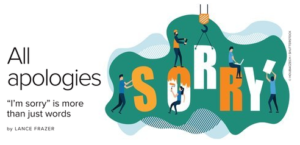It is strange how one can find wisdom in the most unexpected places, at the most unexpected times:
I was standing in line in Costco, a place I go to for great produce at great prices, not expecting to find professional reading or life-coaching advice. On this particular day last week, the purpose of the trip was to purchase the Costco Chocolate Cake, a large, rich and luscious cake I planned to bring to the University Dorm for a whole group of young friends who were going to toast my daughter’s birthday and enjoy this extreme chocolate extravaganza.
I have an uncontrolled attraction to the written word, and must read anything that is in my grasp. So standing in line, I flipped through the Costco Connection magazine that was in the cart, and stumbled upon a well-written one-page description of what a good apology ought to include.
Now we can all use a good guide to a good apology. We all make mistakes, we all regret some of the words we uttered, or an impulsive act taken at an inopportune moment. These mis-steps are unavoidable, but they require rapid repair. Making a mistake is human, but failing to correct a mistake is the real problem, as it can spoil relationships and create unspoken resentments. Yet most of us are not so good at offering a truly good apology.
Lance Frazer’s article in the Costco Connection (of all places…) summarizes the elements of a good apology, based on the research work of Roy Lewicki, Professor Emeritus of management and human resources at The Ohio State University’s Fisher College of Business. Lewicki states that the elements that make a good apology are:
- An expression of regret
- An explanation of what went wrong
- An acknowledgement of responsibility
- A declaration of repentance
- An offer of repair
- A request for forgiveness.
The more of these elements you include, the better the apology, according to Lewicki. These guidelines provide valuable advice, as people often get stuck in the aftermath of a negative interaction, with one party offering a general and non-specific apology that does not really make things better for the other. To make things worse, the one offering the apology often gets exasperated by the fact that their apology does not seem to be accepted: “but I said I’m sorry!”
Life is short, relationships are important. We have to learn to clear the air in a way that truly shows we care about the way the other feels.
To go to an online version of the full article, click on the image below.
Irit Felsen


Leave a Reply